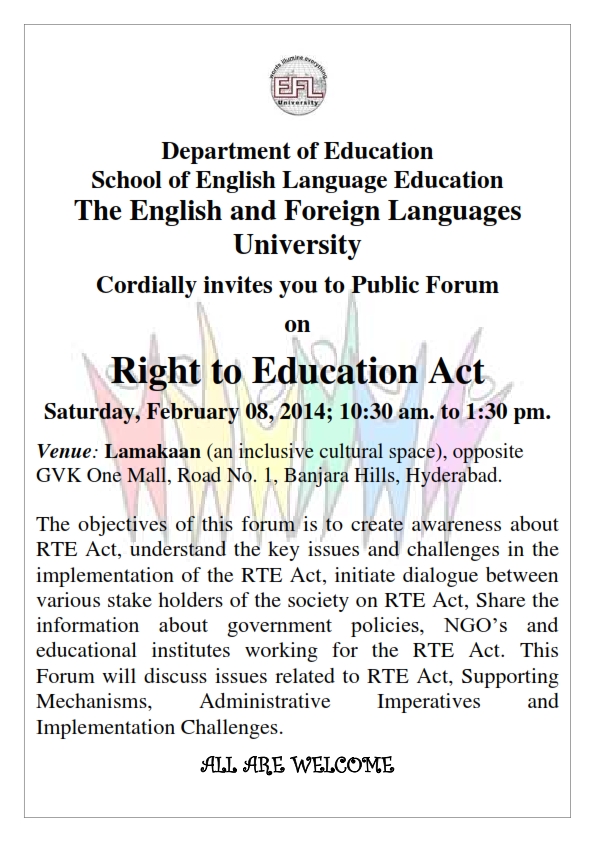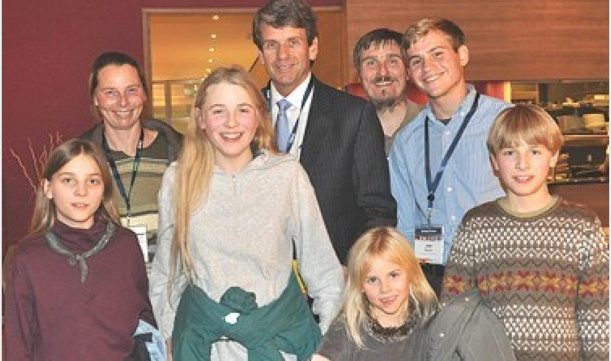Mohammed Kalimullah, a Ph D scholar from the Department of Education; EFL University, Hyderabad had hosted an open forum on Right To Education Act at Lamakaan. The objectives of the forum were to create awareness about RTE Act, understand the key issues and challenges in the implementation of the RTE Act, initiate dialogue between various stake holders of the society on RTE Act, Share the information about government policies, NGO’s and educational institutes working for the RTE Act. The Forum discussed issues related to RTE Act, Supporting Mechanisms, Administrative Imperatives, and Implementation Challenges.

Invitation for open forum on Right to Education Act at Lamakaan, Hyderabad
Some of the stake holders invited to participate were Hon’ble Judge Mr. D. Durga Prasad, Principal Magistrate Juvenile justice Board, R.R. Dist; Mrs. Sunitha, Assistant professor, IASE, Osmania University; Dr. A Srinivas, Asst. Prof Polital Science, Kakatiya University; Venkateshwarlu Geriti, social worker Students for liberty; Mrs. P. Padmavathi, Member of CWC; Mr. K. Papi Reddy, State vice President (PRTU), Mr. M. Harish Mandal Resource person, Mahboob Nagar and many government and private teachers, principals, research Scholars from different Universities will participate in the forum discussion.
Questions presented for discussion:
- Could RTE make a difference in a child’s life and his education status after 3 years of implementation?
- Why is there indifference to its implementation?
- Why government schools have failed and lost faith of people?
- Why the present education system creating inequalities in children society and education system at large?
- Why is there exclusion of early childhood education from RTE Act?
- Why is there admission based on age but there is no facility for bridge courses before admission?
- Why is there no detention policy instead of improving the quality of education?
- Why the norms and standards specified in the schedule to the Act are excessively input focussed and do not ensure learning outcomes?
- What is the recognition process of state schools and teacher education colleges to meet the provisions of the Act “Quality education for all”?
- Why is there discrimination of students in implementing 25% reservation of seats in private schools?
- What are provisions for Orphans, Child labourers, Street children, School dropouts, out of school children in the Act and how much has been achieved in bringing these children in the mainstream of education?
- What does the Act say about the quality of teacher, teacher education and teacher pupil ratio? And what is the present situation?
- What are the major causes for mismatch between demand and supply factor in RTE Act?
- RTE Act designated National commission for Protection of Childs Rights to monitor the provisions of the Act but why is there no legal authority with NCPCR?
- Will common school system ensure quality education for all?
Yugandhar, a home schooling parent from Hyderabad attended this forum, and here is his informal account from a perspective relevant to homeschoolers.
*****
I attended this session today. It was for about three hours by one research scholar Mr.kalimullah. I will try to capture in this mail what happened during those three hours and what part I played.
The session started late by half an hour and Mr.K took another fifteen minutes to introduce the invited dignitaries and self-introduction of uninvited and unknown faces like me. Few professors, asst-professors, govt school teachers from neighboring districts, freelance writers, a few journalists, a private school principal, few youth leaders of student organisations, friends of Mr.K (mostly phd students ), founder of some NGO etc., totaling about 100 persons attended the session.
Copies of the RTE act were distributed to everyone(luckily i didn’t print it yesterday 🙂 ). First the presenter went through all the inclusions in the act quickly and invited the main guests to present their views on the act. People expressed concerns about the known issues prevailing currently in schools like lack of sanitation for girls leading to drop outs after 6th standard or so, lack of pre-primary education system (anganwadi) being integrated with the primary school leading to poaching by private institutions( a student who joins in nursery/lkg etc in pre-primary will naturally go to a private institution), craze of parents to get their children english educated, improvement of transportation in villages leading to students going to pvt schools in nearby town, children taken away for 2 months for ag.work, lack of life skills leading t o suicides etc, definition of success, interest based learning, how rural people have to be ‘educated’ to send their children to school, flouting of RTE act by the cent.govt itself like conducting tests for admissions in Navodaya, and govt. schools getting the left over *material* (which is good for nothing), all children are not born equal and they must be supported as per their interests and skills etc. Teachers narrated how the act puts all the burden on the teachers and not on the parents and society at large.
Many people were of the opinion that govt.schools had better skilled teachers than pvt.institutions, how the pupils of govt. schools are most equipped to handle life’s challenges, and how teaching in mother tongue is extremely important (as many a research proves), and many people narrated how they learnt english later in life etc. All in all, people were discussing about the ‘known’ issues and one person just touched on the *point 11* in the attached pic which is our point. He said that no body has any idea about it.
Almost near the end, I took a chance to speak for around 5 minutes. I started by saying that there are families who are ‘out of school’ by choice due to various reasons. They are not against the school system per se, but they have some reservations with the system and chose to opt out. I mentioned about the case of shreya sahai, alternative learning spaces which do not conform to any standards of the RTE school definition but are doing excellent job of educating children, and how NIOS is under the axe. I mentioned about homeschooling and unschooling, the informal group of homeschooling families called swashikshan, the upcoming conference and asked the people to look up for these keywords in the internet for more information. I concluded that RTE does not have space for any alternative learning spaces, alternative methods of education and anything that is not mainstream. My talk was well received and few people followed up with me to know more. There was a man who is very much interested in HS abt his 4 year old daughter and knows few names and people in our circles (Aravinda, Sangeeta sriram, sailaja karanam etc). I talked to him for about 40 minutes. He was keen to know about the support that swashikshan extends. I explained to him about how we are totally informal group, and how people share their experiences and resources for any one who is seriously interested in HS. The presenter thanked me for bringing up a rather unknown aspect of education and learning.



